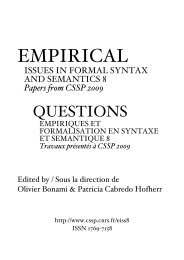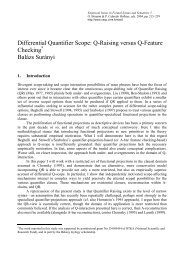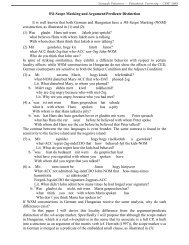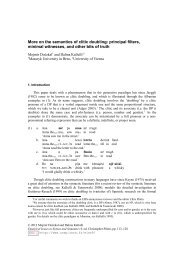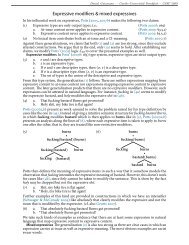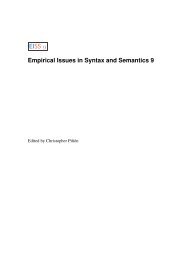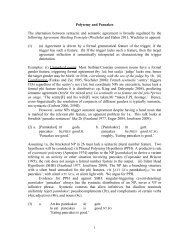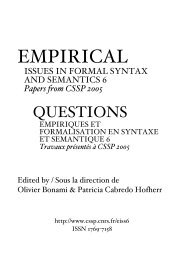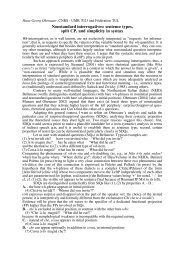Russian peripheral reciprocal markers and ... - CSSP - CNRS
Russian peripheral reciprocal markers and ... - CSSP - CNRS
Russian peripheral reciprocal markers and ... - CSSP - CNRS
Create successful ePaper yourself
Turn your PDF publications into a flip-book with our unique Google optimized e-Paper software.
Empirical Issues in Syntax <strong>and</strong> Semantics 8<br />
O. Bonami & P. Cabredo Hofherr (eds.) 2011, pp. 313–332<br />
http://www.cssp.cnrs.fr/eiss8<br />
<strong>Russian</strong> <strong>peripheral</strong> <strong>reciprocal</strong> <strong>markers</strong> <strong>and</strong><br />
unaccusativity<br />
Alex<strong>and</strong>er Letuchiy ∗<br />
Introduction<br />
In the last few decades, the unaccusativity hypothesis <strong>and</strong> notion of unaccusativity<br />
has been widely discussed in linguistics. The hypothesis, as formulated by Perlmutter<br />
(1976), Rosen (1984), Mithun (1991), <strong>and</strong> others, says that the class of intransitive<br />
verbs is not homogenous. Different syntactic criteria show that in many languages one<br />
observes two classes of intransitives: unaccusative verbs <strong>and</strong> unergative verbs. The former<br />
are, roughly speaking, ‘patientive’ verbs which denote a situation which the subject<br />
does not control – in other words, the subject is a patient rather than an agent,<br />
since the absence of control, according to Dowty (1991) <strong>and</strong> Ackerman & Moore (2001)<br />
characterizes prototypical patients, <strong>and</strong> not prototypical agents. Structurally, according<br />
to Perlmutter (1976), the subject of unaccusatives at some level of representation<br />
occupies the same place as the object of transitive verbs.<br />
In contrast, the core of the unergative class includes situations controlled by the<br />
subject (though other verbs join the unergative class as well). In the syntactic structure,<br />
the subject occupies the same place as the subject (agent) of transitive verbs.<br />
In this paper, I discuss ‘<strong>peripheral</strong>’ <strong>reciprocal</strong> <strong>markers</strong> in <strong>Russian</strong> 1 . First, I analyze<br />
the grammatical properties of the prefix vzaimo- ‘mutually’. Surprisingly, this prefix,<br />
which cannot be the sole <strong>reciprocal</strong> marker in the verb form, can serve as the sole<br />
marker in nouns <strong>and</strong> even in participles. I am trying to explain this difference between<br />
verbs vs. participles <strong>and</strong> nouns. I argue that there are reasons to treat verbs carrying<br />
this prefix as unaccusatives, though they are not at all typical representatives of the<br />
unaccusative class. Then, I turn to the adverbial vzaimno ‘mutually’. This marker is<br />
always optional <strong>and</strong> accompanied by another <strong>reciprocal</strong> marker, but I will show that it<br />
has a peculiar semantic property: it is compatible with structures including the reflexive<br />
possessive pronoun svoj ‘own’ <strong>and</strong> changes the interpretation of svoj. In Section<br />
1, I briefly present different means of expressing reciprocity in <strong>Russian</strong>, including the<br />
suffix -sja, the <strong>reciprocal</strong> pronouns drug druga <strong>and</strong> odin drugogo, 2 <strong>and</strong> the <strong>markers</strong><br />
∗ I thank Barbara Partee, Leonid L. Iomdin <strong>and</strong> the anonymous reviewer for their useful questions<br />
<strong>and</strong> comments. The present research was financed by the President of Russia’s research grant number<br />
MK-3522.2010.6.<br />
1 The term ‘<strong>peripheral</strong>’ refers both to low frequency of these lexical items <strong>and</strong> to absence of attention<br />
to them in linguistic research.<br />
2 Drug druga <strong>and</strong> odin drugogo are called ‘pronouns’ in <strong>Russian</strong> grammar tradition. In fact, though,
314 Alex<strong>and</strong>er Letuchiy<br />
vzaimo-, vzaimno <strong>and</strong> vzaimnyj. In my paper, I will focus on the last group of <strong>markers</strong>.<br />
In Section 2, the prefix vzaimo- <strong>and</strong> its relation to reciprocity <strong>and</strong> unaccusativity is<br />
discussed. Finally, in Section 3, I analyze the properties of the adverbial vzaimno.<br />
1 Means of expressing reciprocity in <strong>Russian</strong><br />
In <strong>Russian</strong>, as in many other languages, reciprocity is expressed with a variety of means<br />
which belong to different domains of grammar.<br />
1.1 Pronoun drug druga<br />
The main <strong>reciprocal</strong> marker, both in respect of text frequency <strong>and</strong> lexical productivity,<br />
is the pronoun drug druga ‘each other’. Though synchronically it seems to include the<br />
forms of the word drug ‘friend’, historically it contains two forms of the short masculine<br />
form of adjective drugoj ‘other’ which is rather natural for <strong>reciprocal</strong> <strong>markers</strong>.<br />
The first component of the pronoun is always in the form drug 3 , whereas the second<br />
one reflects the case <strong>and</strong> syntactic position of the second (syntactically lower) participant<br />
of the <strong>reciprocal</strong> relation: it is accusative DO in (1), dative IO in (2) <strong>and</strong> accusative<br />
complement of the preposition za ‘for’ in (3) 4 .<br />
(1) Vanj-a i Petj-a ne ljubi-l-i drug drug-a.<br />
Vanja-NOM <strong>and</strong> Petja-NOM not like-PST-PL other other-ACC<br />
‘Vasja <strong>and</strong> Petja did not like each other.’<br />
(2) My doverja-em drug drug-u.<br />
we trust-PRS.1PL other other-DAT<br />
‘We trust to each other.’<br />
(3) Na vybor-ax politik-i<br />
golosuj-ut drug za drug-a.<br />
on election-PL.LOC politician-PL.NOM vote-PRS.3PL other for other-ACC<br />
‘On the elections, the politicians vote for each other.’<br />
The pronoun has virtually no restrictions on its use except the one which was pointed<br />
at by Knjazev (2007): the pronoun can hardly be used in the position of agentive instrumentally-marked<br />
NP in passive constructions such as ranen-y drug drug-om ‘injured<br />
by each other’(injure.PART.PASS-PL other-NOM other-INS).<br />
they are complex diachronically <strong>and</strong> even synchronically: for instance, prepositions occupy the position<br />
between the components of the pronouns <strong>and</strong> not before both components (e.g. drug s drugom ‘with<br />
each other’), contrary to English where prepositions occur before both elements (with each other).<br />
3 Note that this form of the first component does not always correspond to syntactic subject. The<br />
pronoun drug druga can be bound by two non-subject referents, for instance: Ja poznakomi-l- Vasj-u<br />
i Petj-u drug s drug-om (I.NOM introduce-PST-SG.M Vasja-ACC <strong>and</strong> Petja-ACC other with other-INS)<br />
‘I introduced Vasja <strong>and</strong> Petja to each other’, where the pronoun is bound by the direct object <strong>and</strong> the<br />
prepositional phrase with s ‘with’.<br />
4 Abbreviations: 1, 2, 3 - first, second, third person; ACC - accusative case; DAT - dative case; F -<br />
feminine; INS - instrumental case; LOC - locative case; M - masculine; NACT - non-active (middle)<br />
inflection; NOM - nominative case; PART - participle; PASS - passive; PL - plural; PREF - prefix; PRS -<br />
present tense; PST - past tense; REC - <strong>reciprocal</strong>; REFL - reflexive; SG - singular.
<strong>Russian</strong> <strong>peripheral</strong> <strong>reciprocal</strong> <strong>markers</strong> <strong>and</strong> unaccusativity 315<br />
Another <strong>reciprocal</strong> pronoun is odin drugogo ‘one another’ which is much less frequent<br />
than drug druga but does not differ from it significantly, both in semantic <strong>and</strong><br />
syntactic respects. For instance, in examples (1)-(3) odin drugogo could be substituted<br />
for drug druga. Knjazev (2007) notes that there is one semantic difference, though it<br />
is a tendency, rather than a strict rule: odin drugogo, more than drug druga, tends to<br />
denote <strong>reciprocal</strong> relation between two participants.<br />
1.2 Suffix -sja<br />
The most grammaticalized (but not the most frequent <strong>and</strong> productive) marker of reciprocity<br />
is the intransitivizer -sja. Though almost all European languages have a cognate<br />
suffix or clitic, productivity of particular readings differs from one language to<br />
another. In some languages, such as Bulgarian <strong>and</strong> French, the <strong>reciprocal</strong> reading is<br />
very productive, whereas in some others, including <strong>Russian</strong>, it appears to be a <strong>peripheral</strong><br />
phenomenon. According to Knjazev (2007), only two groups of verbs regularly<br />
have <strong>reciprocal</strong> derivatives on -sja: namely, aggressive contact verbs, such as tolkat’<br />
‘push’, pixat’ ‘push aggressively’, <strong>and</strong> ‘close relation verbs’ – the group which includes<br />
some verbs of contact, such as celovat’ ‘kiss’, obnimat’ ‘hug’, as well as some lexemes<br />
denoting social events, for instance, vstretit’ ‘meet’, uvidet’ ‘see’, ‘meet’:<br />
(4) a. Paren’-<br />
celova-l-<br />
devušk-u.<br />
boy-SG.NOM kiss-PST-SG.M girl-SG.ACC<br />
‘The boy kissed the girl.’<br />
b. Na skamejk-e celova-l-i-s’ paren’- i devušk-a.<br />
on bench-SG.LOC kiss-PST-PL-REC boy-SG.NOM <strong>and</strong> girl-SG.NOM<br />
‘A boy <strong>and</strong> a girl were kissing on the bench.’<br />
(5) a. Menja kto-to<br />
tolknu-l-.<br />
I.ACC someone.SG.NOM push-PST-SG.M<br />
‘Someone pushed me.’<br />
b. V metro vs-e tolkaj-ut-sja<br />
in metro all-PL.NOM push-PRS.3PL-REC<br />
‘Everyone pushes each other in the metro.’<br />
In other words, we can say that -sja alone marks the <strong>reciprocal</strong> meaning with ‘inherent<br />
<strong>reciprocal</strong>s’ (Kemmer 1993):<br />
celovat'-sja ‘kiss each other’<br />
obnimat’-sja ‘hug each other’<br />
tolkat’-sja ‘push each other’<br />
traxat’-sja ‘fuck each other’<br />
vstrečat’-sja ‘meet each other’<br />
videt’-sja ‘meet each other’ (lit. ‘see each other’)<br />
Inherent <strong>reciprocal</strong>s, in Kemmer’s definition, are verbs describing situations which<br />
are more natural (or at least not less natural) in their <strong>reciprocal</strong> variants than in non<strong>reciprocal</strong><br />
ones. For instance, very often when A kisses B, B also kisses A (although it is<br />
not obligatory). The situation ‘meet’ is in a sense obligatorily <strong>reciprocal</strong>: if A meets B,<br />
it is also true that B meets A.<br />
The suffix -sja has also a range of other meanings which have been discussed in<br />
a number of works, including Janko-Trinickaja (1962), Knjazev (2007a, 2007b), <strong>and</strong> so<br />
on. Let us quote only some most productive <strong>and</strong> textually frequent meanings:
316 Alex<strong>and</strong>er Letuchiy<br />
Anticausative meaning:<br />
(6) a. Vasj-a<br />
razbi-l-<br />
čašk-u.<br />
Vasja-SG.NOM break-PST-SG.M cup-SG.ACC<br />
‘Vasja broke the cup.’<br />
b. Čašk-a razbi-l-a-s’.<br />
Reflexive meaning:<br />
(7) a. Maš-a<br />
cup-SG.NOM break-PST-SG.F-REFL<br />
‘The cup broke.’<br />
brej-et<br />
dedušk-u.<br />
Masha-SG.NOM shave-PRS.3SG gr<strong>and</strong>father-SG.ACC<br />
‘Masha shaves her gr<strong>and</strong>father.’<br />
b. Dedušk-a<br />
brej-et-sja.<br />
gr<strong>and</strong>father-SG.NOM shave-PRS.3SG-REFL<br />
‘The gr<strong>and</strong>father shaves.’<br />
The suffix also has passive meaning (see 18 below).<br />
This polysemy may seem to be irrelevant for the <strong>reciprocal</strong> issue; however, below I<br />
will show that it is crucial for our topic that -sja has not only <strong>reciprocal</strong>, but also reflexive<br />
<strong>and</strong> other readings.<br />
1.3 Vzaimo-, vzaimnyj, vzaimno<br />
The present paper will be focused on the <strong>reciprocal</strong> prefix vzaimo-. This marker belongs<br />
to a group of <strong>markers</strong> derived from stem vzaim-: there is also adjective vzaimnyj<br />
‘mutual’ <strong>and</strong> adverb vzaimno ‘mutually’. Let me first sketch some features of the adjective<br />
<strong>and</strong> the adverb.<br />
1.3.1 Vzaimnyj<br />
The adjective vzaimnyj modifies nouns (mainly deverbal nouns):<br />
(8) vzaimn-aja<br />
ljubov’-<br />
mutual-F.SG.NOM love-SG.NOM<br />
‘mutual love’<br />
(9) vzaimn-yje<br />
oskorblenij-a<br />
mutual-PL.NOM insult-PL.NOM<br />
‘mutual insults’<br />
In most cases, the same verbal nouns can combine with drug druga, the two constructions<br />
being roughly similar, as in (10):<br />
(10) ljubov’- drug k drug-u<br />
love-SG.NOM other for other-DAT<br />
‘love for each other’
<strong>Russian</strong> <strong>peripheral</strong> <strong>reciprocal</strong> <strong>markers</strong> <strong>and</strong> unaccusativity 317<br />
There are, however, some exceptions when constructions with drug druga are impossible,<br />
less frequent or awkward. For instance, the construction with drug druga in genitive<br />
is impossible for the noun oskorblenije ‘insult’<br />
(11) *oskorblenij-a drug drug-a<br />
insult-PL.NOM other other-GEN<br />
Intended: ‘mutual insults’<br />
The sole possible construction is oskorblenija v adres drug druga [lit. insult-PL.NOM<br />
in address other other-GEN] ‘insults directed against each other’. Here, drug druga is<br />
governed by the complex preposition v adres + GEN ‘in address, directed to’. However,<br />
this variant is much less frequent <strong>and</strong> much worse stylistically than (9).<br />
Cases like (11) usually emerge when the base verb which the noun is derived from is<br />
transitive <strong>and</strong> the participants of the <strong>reciprocal</strong> relation are Subject <strong>and</strong> Direct object.<br />
Some transitive verbs, such as ljubit’ ‘love’ in (8) <strong>and</strong> (10) seem to be counterexamples,<br />
because their deverbal nouns can take a prepositional object. However, when the deverbal<br />
noun can only take a genitive object (this is the case of oskorbljat’ ‘inslut’: the<br />
noun oskorblenije can only take a genitive object, cf. oskorblenij-e milicioner-a [insult-<br />
SG.NOM policeman-SG.GEN]), the construction with drug druga is impossible.<br />
1.3.2 Vzaimno<br />
The adverb vzaimno ‘mutually’, contrary to vzaimnyj ‘mutual’, cannot be the sole marker<br />
of reciprocity in the clause; it must be accompanied by -sja or drug druga (in terms of<br />
Nedjalkov & Geniušienė (2007) it is an adverbial modifier). For instance, in (12) the<br />
main <strong>reciprocal</strong> marker is drug druga:<br />
(12) Oba userdno prinja-l-i-s’ vzaimno oskorblja-t’ drug-<br />
both.NOM heartily begin-PST-PL-REFL mutually offend other-NOM<br />
drug-a.<br />
other-ACC<br />
‘Both of them begin heartily to offend each other’.<br />
If drug druga was eliminated from (12), the sentence would become ungrammatical.<br />
However, below I will present a piece of evidence that the adverb vzaimno is not a pure<br />
modifier either.<br />
2 Prefix vzaimo-<br />
The prefix vzaimo- is not a very productive marker. It appears mainly in the formal<br />
style <strong>and</strong> is not very frequent in the <strong>Russian</strong> National Corpus. The prefix can modify<br />
verbs (13a) <strong>and</strong> nouns (13b), it can also sometimes occur with adjectives (13c).<br />
(13) a. Častic-y<br />
vzaimo-uničtožaj-ut-sja.<br />
particle-PL.NOM REC-destroy-PRS.3PL-REC<br />
‘The particles destroy each other.’<br />
b. vzaimo-svjaz’-<br />
REC-connection-SG.NOM
318 Alex<strong>and</strong>er Letuchiy<br />
‘mutual relation’<br />
c. vzaimo-vygodn-yj<br />
REC-beneficial-NOM.SG.M<br />
‘mutually beneficial’<br />
We will first discuss the use of vzaimo- with finite forms of verbs.<br />
Vzaimo- with finite forms of verbs<br />
With finite forms, the prefix vzaimo-, like the adverb vzaimno ‘mutually’, cannot<br />
be the sole marker of reciprocity. This is why (14) is ungrammatical, contrary to (13a)<br />
which is perfectly correct:<br />
(14) *Častic-y<br />
vzaimo-uničtožaj-ut.<br />
particle-PL.NOM REC-destroy-PRS.3PL<br />
‘The particles destroy each other.’<br />
A rare case when vzaimo- is the sole <strong>reciprocal</strong> marker is illustrated by (15):<br />
(15) Sotrudnik-i<br />
vzaimo-dejstvuj-ut.<br />
worker-PL.NOM REC-act-PRS.3PL<br />
‘The workers interact.’<br />
However, in this case the prefixal derivative has undergone some lexicalization: its<br />
meaning ‘interact’ is rather far from ‘act on each other’ – we can rather rephrase it<br />
as ‘act together, contacting each other’, therefore, in this case vzaimo- marks something<br />
different from the <strong>reciprocal</strong> meaning sensu stricto. Moreover, the use of vzaimoin<br />
(15) is not very typical, because the verb dejstvovat’ ‘act’ is intransitive, <strong>and</strong> vzaimomainly<br />
attaches to transitive verbs. In any case, -sja in the <strong>reciprocal</strong> reading is impossible<br />
for (15).<br />
In what follows, I will analyze syntactic properties of vzaimo-. I will show that,<br />
although this prefix is usually accompanied with other means of expressing reciprocity,<br />
it cannot be regarded as a pure case of optional modifier.<br />
2.1 Is vzaimo- just a modifier<br />
In most cases, the suffix -sja is used together withvzaimo-. Addition of -sja to (14)<br />
makes the sentence grammatical:<br />
(16) Častic-y<br />
vzaimo-uničtožaj-ut-sja.<br />
particle-PL.NOM REC-destroy-PRS.3PL-REC<br />
‘The particles destroy each other.’<br />
(=13a)<br />
The sentence (16) bears the same <strong>reciprocal</strong> meaning as examples (1)-(5) <strong>and</strong> (5). This<br />
makes us think about the status of vzaimo-.<br />
Indeed, if -sja-derivatives without vzaimo- bear the same meaning as with vzaimo-,<br />
this seems to mean that vzaimo- is not really a <strong>reciprocal</strong> marker. It is rather a <strong>reciprocal</strong><br />
modifier, just as the adverb vzaimno:<br />
(17) My<br />
we.NOM<br />
vzaimno podderživa-l-i odin- drug-ogo.<br />
mutually support-PST-PL one-M.SG.NOM other-M.SG.GEN
<strong>Russian</strong> <strong>peripheral</strong> <strong>reciprocal</strong> <strong>markers</strong> <strong>and</strong> unaccusativity 319<br />
‘We (mutually) supported one another.<br />
In (17), it is possible to eliminate vzaimno, but the meaning will not change <strong>and</strong> the<br />
reciprocity will remain the same.<br />
However, the situation of vzaimo- is not that simple. Elimination of vzaimo- from<br />
(16) will lead to a grammatical possible structure, but with different meaning:<br />
(18) Častic-y<br />
uničtožaj-ut-sja.<br />
particle-PL.NOM destroy-PRS.3PL-REC<br />
i. ‘The particles are destroyed (by sth. or sb.).’<br />
ii. ‘The particles disappear (by themselves).’<br />
iii. *‘The particles destroy each other.’<br />
The main meaning of (18) is passive, where an agent not mentioned in the sentence<br />
destroys the particles. Another meaning which is a bit colloquial but nevertheless perfectly<br />
grammatical is anticausative where the particles are destroyed or disappear by<br />
themselves. However, the sentence has no longer the <strong>reciprocal</strong> reading. As I have<br />
mentioned, -sja denotes reciprocity with only two restricted verb classes, <strong>and</strong> the verb<br />
uničtožat’ ‘destroy, make disappear’ does not belong to either of them.<br />
2.2 Circumfix<br />
Therefore, we face a problem: in (16), two <strong>markers</strong> express reciprocity, but neither of<br />
them can express it alone. A usual solution in this situation is to postulate a circumfix<br />
vzaimo-. . . -sja which expresses reciprocity as a whole.<br />
In fact, this solution seems plausible, because <strong>Russian</strong> has a number of circumfixes<br />
including a verbal prefix <strong>and</strong> the suffix -sja:<br />
(19) a. Malčik-i<br />
beg-ut.<br />
boy-PL.NOM run-PRS.3PL<br />
‘The boys run.’<br />
b. Malčik-i raz-beža-l-i-s’.<br />
boy-PL.NOM PREF-run-PST-PL-REFL<br />
‘The boys ran to different directions, one from another.’<br />
It is impossible to eliminate either the prefix raz- or the suffix -sja: verb forms *raz-bežat’<br />
<strong>and</strong> *bežat’-sja do not exist. Therefore, the meaning of motion in different directions is<br />
expressed by the complex of two <strong>markers</strong>. Moreover, in this particular case the meaning<br />
is very close to <strong>reciprocal</strong>: the situation is symmetrical, the subject is obligatorily<br />
plural (or collective), <strong>and</strong> each of them moves in the same way with respect to the others.<br />
Unfortunately, this solution is hardly plausible for vzaimo-. The reason is that the<br />
verb form vzaimouničtožat’ (<strong>and</strong> similar ones) sometimes occur without -sja. The suffix<br />
can be replaced with the <strong>reciprocal</strong> pronoun drug druga <strong>and</strong> odin drugogo:<br />
(20) Et-i<br />
kul’tur-y<br />
vzaimo-obogaščaj-ut drug drug-a.<br />
this-NOM.PL culture-NOM.PL REC-enrich-PRS.3PL<br />
‘These cultures mutually enrich each other.’<br />
each.other-ACC
320 Alex<strong>and</strong>er Letuchiy<br />
In this case, vzaimo- is really a modifier – in other words, the sentence has the same<br />
meaning without it. However, existence of structures like (20) make the circumfix analysis<br />
problematic: it means that vzaimo- can occur without -sja. For circumfixes like<br />
raz-. . . -sja it is impossible: for instance, the meaning of motion in different directions<br />
with the verb bežat’‘run’ can only be expressed by the combination of prefix <strong>and</strong> suffix.<br />
Structures like (20) also pose the problem of relative order of derivations. On the<br />
one h<strong>and</strong>, if we consider that vzaimo- is attached first, <strong>and</strong> then drug druga is added,<br />
this analysis cannot explain why the sentence is ungrammatical without drug druga.<br />
On the other h<strong>and</strong>, it is equally implausible to consider that drug druga is attached<br />
first: in general, it is strange for a morphological marker to be attached after a free<br />
lexical item. In what follows, I will explain that vzaimo- is attached before, <strong>and</strong> not<br />
after drug druga.<br />
The distribution of -sja <strong>and</strong> drug druga in constructions with vzaimo- is unclear.<br />
However, it seems that two factors play a role: degree of lexicalization <strong>and</strong> degree of<br />
patientivity of the subject. vzaimo-. . . -sja, contrary to vzaimo- + drug druga, is used<br />
when the <strong>reciprocal</strong> verb is more lexicalized <strong>and</strong> the subject is patientive or, at least, is<br />
not a prototypical agent.<br />
To account for this situation I will consider applications of unaccusativity hypothesis<br />
proposed for similar cases.<br />
2.3 Unaccusativity<br />
In the literature, we observe very similar examples in works by Alexiadou, Anagnostopolou<br />
(2004), Embick (2004) <strong>and</strong> others. The difference is that it occurs in the domain<br />
of reflexivity, rather than reciprocity.<br />
In Modern Greek as well as in Fula (Atlantic, Western Africa), Tolkopaya (a dialect<br />
of Yavapai, Yuman, western Arizona) <strong>and</strong> a number of other languages mentioned by<br />
Embick (2004), there exists a reflexive marker which is not entirely grammaticalized (it<br />
cannot be the sole reflexive marker). It must be accompanied by a grammatical marker<br />
of intransitive / unaccusative configuration or by inactive (middle) inflection <strong>markers</strong>:<br />
Greek:<br />
(21) I<br />
Maria htenizete<br />
kathe mera.<br />
the.NOM.SG.F Maria comb:NACT.3SG.PRS every day<br />
‘Maria combs everyday.’ (active form: htenizei).<br />
(22) O<br />
the.NOM.SG.M<br />
Yanis afto-katastrefete.<br />
Yanis self-destroy:NACT.3SG.PRS<br />
‘Yanis destroys himself.’ (active form: katastrafei).<br />
For instance, neither in (21), nor in (22) in Greek can we replace the non-active inflection<br />
type with the active one – the resulting structure is ungrammatical.<br />
Moreover, the lexical distribution of two ways of expressing reflexivity: one with<br />
the non-active inflection only, as in (21), <strong>and</strong> one with the non-active inflection <strong>and</strong><br />
the prefix afto-, as in (22) is roughly the same as the distribution of -sja <strong>reciprocal</strong>s<br />
<strong>and</strong> vzaimo-. . . -sja <strong>reciprocal</strong>s in <strong>Russian</strong>. For instance, in Greek, reflexivity can be<br />
expressed by the sole change of inflection type only inside a small group of grooming
<strong>Russian</strong> <strong>peripheral</strong> <strong>reciprocal</strong> <strong>markers</strong> <strong>and</strong> unaccusativity 321<br />
verbs, such as htenizo ‘comb’ which, according to Kemmer (1993) are the best c<strong>and</strong>idates<br />
to form grammatical reflexives. Outside this group, change of inflection type expresses<br />
other meanings related to detransitivization <strong>and</strong> non-agentivity: for instance,<br />
without afto-, (23) will have the passive meaning:<br />
(23) O<br />
the.NOM.SG.M<br />
Yanis katastrafike.<br />
Yanis destroy:NACT.3SG.PST<br />
‘Yanis was destroyed.’<br />
Embick proposes that afto-derivatives <strong>and</strong> their analogues are something like ‘passives’.<br />
More precisely, he thinks that the structure is as in (24):<br />
(Embick 2004: 145)<br />
(24) the structure of afto-reflexives<br />
vP<br />
afto-<br />
ROOT<br />
v<br />
P<br />
ROOT DP<br />
In other words, Embick supposes (22) is literally something like ‘Yanis is self-destroyed’,<br />
<strong>and</strong> not ‘Yanis destroys himself’, as the most natural translation presupposes. The<br />
structure in (22) is passive, just as in (23) – the prefix afto- simply occupies the syntactic<br />
position of the agent of passive construction. The main reasoning he uses is that<br />
afto-formation uses the same inflection type (inactive inflection) as passives <strong>and</strong> anticausatives.<br />
Let us address the question of whether the same line of argumentation is plausible<br />
for <strong>Russian</strong>. The answer seems to be no.<br />
First of all, consider the construction with vzaimo- <strong>and</strong> drug druga. It can hardly<br />
be considered as unaccusative, even if the variant with vzaimo- <strong>and</strong> -sja can. Contrary<br />
to -sja, drug druga hardly changes the transitive verb into an unaccusative – the verb<br />
in (20) continues to be transitive, though the direct object position is occupied by drug<br />
druga. This pronoun is a free <strong>reciprocal</strong> pronoun in terms of Reinhart, Siloni (2004):<br />
according to Nedjalkov (2007), <strong>markers</strong> of this type <strong>markers</strong> do not change transitivity<br />
<strong>and</strong> agentivity of the base verb (the sole difference between drug druga <strong>and</strong> a free NP is<br />
that drug druga is a <strong>reciprocal</strong> anaphor <strong>and</strong> cannot occupy the subject position which<br />
is, however, very typical of anaphors).<br />
Another feature of <strong>Russian</strong> which contradicts the unaccusativity analysis is a special<br />
construction with participles.<br />
2.4 Vzaimo- <strong>and</strong> participles<br />
Surprisingly, vzaimo- behaves in a special way with participles. In such constructions,<br />
-sja is optional, <strong>and</strong> vzaimo-can be the only <strong>reciprocal</strong> marker, as in (25):
322 Alex<strong>and</strong>er Letuchiy<br />
(25) Vzaimo-uničtožaj-ušč-ije-(sja) častic-y.<br />
REC-destroy-PART.PRS-PL.NOM-(REFL) particle-PL.NOM<br />
‘Mutually destroying particles.’<br />
This fact is unexpected from the view of unaccusativity theory, as well as other theories<br />
of transitivity. Grimshaw (1990) <strong>and</strong> Alexiadou (2004) argue that the structure of<br />
deverbal nouns is different from that of verbs. In <strong>Russian</strong>, for instance, deverbal nouns<br />
cannot have a direct object, <strong>and</strong> are syntactically different from verbs in many other<br />
relations. The fact that they can, as in (26), take vzaimo- as the sole <strong>reciprocal</strong> marker,<br />
cannot be considered really surprising (here I do not propose a description for this<br />
fact 5 ).<br />
(26) vzaimo-uničtož-enij-e<br />
REC-destroy-NMLZ-SG.NOM<br />
‘mutual destruction / destroying’ (‘destroying each other’)<br />
Note, for instance, that deverbal nouns in <strong>Russian</strong> cannot take -sja at all (here I do not<br />
address the question why the structure in (26) is not ungrammatical, just like (14) <strong>and</strong><br />
other examples of verbs with vzaimo- as the sole <strong>reciprocal</strong> marker).<br />
However, no difference between finite verbal forms <strong>and</strong> participles is predicted by<br />
the theory. 6 Of course, if -sja was an unaccusativity marker, it would be obligatory<br />
in participles, because otherwise the participle in (25) would not be unaccusative. It is<br />
strange to propose that the same participle of the same verb, such as vzaimo-uničtožajušč-ije-(sja)<br />
in (25), can be or not be unaccusative, depending on the presence of -sja,<br />
whereas the verb with vzaimo- is always unaccusative, because -sja is obligatory in<br />
(16). In our view, this means that vzaimo- should not be considered to be an unaccusativity<br />
marker. Moreover, we should revisit our hypothesis concerning the role of<br />
-sja in examples like (25).<br />
2.5 -sja is a deobjectivizer<br />
As in many languages, in <strong>Russian</strong> the direct object can be omitted under some conditions.<br />
For instance, some verbs admit object omission if the object is generic or indefinite:<br />
(27) Ubiva-t’ grex-.<br />
kill-INF sin-NOM.SG<br />
‘To kill is a sin.’<br />
For emotion verbs, the condition is different: the object can be omitted when it is coreferent<br />
to the speaker or the addressee:<br />
5 What should be noted, however, is that vzaimo- can denote reciprocity on its own, without support<br />
of another <strong>reciprocal</strong> marker. This suggests that the second marker which is added to vzaimo- in previous<br />
examples (e.g., -sja in (16)) bears another function, not that of marking reciprocity. This function<br />
will be discussed in 2.8 below. I thank the anonymous reviewer for discussion of these matters.<br />
6 Along with the active present participle on -ušč /-ašč, <strong>Russian</strong> also has the active past participle with<br />
the marker -vš, the passive present participle with -m <strong>and</strong> the passive past participle with -n. I do not<br />
take into account the passive participles <strong>and</strong> the active past participle takes vzaimo- much more rarely<br />
than the active present participle. In this paper, I discuss only the active present participle.
<strong>Russian</strong> <strong>peripheral</strong> <strong>reciprocal</strong> <strong>markers</strong> <strong>and</strong> unaccusativity 323<br />
(28) Udivlja-et tot<br />
fakt- čto on<br />
surprise-PRS.3SG that.NOM.SG fact that<br />
‘The fact that he did not call surprises (me / us).’<br />
he.NOM<br />
ne pozvoni-l-.<br />
not call-PST-SG.M<br />
The crucial point for our analysis is that some verbs do not admit or rarely admit object<br />
omission in their finite forms. However, their participles can be used without an<br />
object (see also Grimshaw (1990) <strong>and</strong> others for the idea that argument frames can be<br />
postulated only for verbs; however, there seems to be no common opinion concerning<br />
the question whether the participles behave like verbs or like deverbal nouns):<br />
(29) a. Vozdejstvij-e<br />
alkogolj-a<br />
razrušaj-et<br />
[organism-<br />
impact-SG.NOM alcohol-SG.GEN destroy-3SG.PRS [organism-SG.ACC<br />
čelovek-a].<br />
human-SG.GEN]<br />
‘Impact of alcohol destroys human’s body.’<br />
b. razrušaj-ušč-eje<br />
vozdejstvij-e alkogolj-a<br />
destroy-PART.PRS.ACT-NOM.SG.N impact-NOM.SG alcohol-SG.GEN<br />
‘destructive impact of alcohol’ (literally ‘destroyingimpact of alcohol’)<br />
This makes some authors of dictionaries <strong>and</strong> grammars regard forms like razrušajuščij<br />
as adjectives. In any case, the ability of participles to become objectless (or adjectives)<br />
is rather illustrative of their special syntactic properties.<br />
In my opinion, the difference observed with vzaimo- between participles <strong>and</strong> finite<br />
forms is closely related to cases like (29a) <strong>and</strong> (29b). The hypothesis is that vzaimois<br />
not a syntactic modifier: it introduces only the semantics of reciprocity, not changing<br />
transitivity characteristics. And the possibility of objectless use in (25) <strong>and</strong> similar<br />
examples results from inherent syntactic properties of a participle like uničtožaj-uščij<br />
‘destroying’, though a necessary condition for this use is presence of the <strong>reciprocal</strong><br />
component in the meaning of the verb form (this is what vzaimo- denotes).<br />
Now it is easy to see why -sja is used with finite forms of verbs. According to Janko-<br />
Trinickaja (1967) <strong>and</strong> Knjazev (2007), -sja, apart from uses like (6), (7) etc. is sometimes<br />
used as a deobjectivizer: it eliminates the direct object of the base verb:<br />
(30) a. Sobak-a kusa-et svo-ego<br />
dog-SG.NOM bite-PRS.3SG own-M.SG.ACC<br />
‘The dog bites its owner.’<br />
b. Sobak-a kusa-et-sja.<br />
dog-SG.NOM bite-PRS.3SG-REFL<br />
‘The dog bites.’ (lit. ‘The dog bites itself’).<br />
xozjain-a.<br />
owner-SG.ACC<br />
In examples like (30b), it is hardly plausible to regard the verb as unaccusative. For<br />
instance, circumstances like special’no ‘by purpose’ are possible with the verb okusat’-<br />
sja, which is unusual for unaccusatives.<br />
In another use, -sja does not eliminate the object, but demotes its status to a <strong>peripheral</strong><br />
instrumental NP:<br />
(31) a. Vas’-a kidaj-et<br />
Vasja-NOM throw-3SG.PRS<br />
‘Vasja throws stones.’<br />
kamn-i.<br />
stone-PL.ACC
324 Alex<strong>and</strong>er Letuchiy<br />
b. Vas’-a<br />
kidaj-et-sja<br />
kamn’-ami.<br />
Vasja-NOM throw-3SG.PRS -REFL stone-PL.INS<br />
‘Vasja throws stones.’ (lit. ‘Vasja throws with stones’).<br />
While vzaimo- is really only a semantic operator, but not a syntactic marker of reciprocity,<br />
this means that another marker of object demotion is needed: -sja fulfills this<br />
function in examples like (16).<br />
Drug druga also fulfills the syntactic function in structures like (17). While the semantic<br />
component of reciprocity is already marked by vzaimo-, the verb is transitive<br />
<strong>and</strong> should have the DO position filled: this is why drug druga is used <strong>and</strong> why the<br />
sentence is ungrammatical without this pronoun.<br />
2.6 Traces of unaccusativity<br />
Though I have shown that vzaimo-derivatives are not obligatorily unaccusatives, a<br />
piece of evidence points to the fact that vzaimo- is in a way related to unaccusativity.<br />
No verb which can be modified by vzaimo- has an agentive subject. Some of these<br />
verbs, such as izmenit’ ‘change’, uničtožat’ ‘destroy’ <strong>and</strong> so on, can in principle have<br />
agentive subjects, but in this case reciprocity is not usually marked by vzaimo- <strong>and</strong> is<br />
never marked by the combination of vzaimo- <strong>and</strong> -sja.<br />
2.7 Incorporation<br />
We have analyzed the synchronic properties of vzaimo-. However, how did a situation<br />
like this occur historically Let us say some words on the history of this prefix.<br />
Historically, vzaimo- is an incorporated variant of the adverb vzaimno. In <strong>Russian</strong>,<br />
incorporation is characteristic for nouns <strong>and</strong> participles, but not finite verb forms:<br />
(32) a. kislorod-soderž-ašč-ij<br />
oxygen-contain-PART.PRS.ACT-SG.M.NOM<br />
‘oxygen-containing’<br />
b. *kislorod-soderža-t’<br />
oxygen-contain-INF<br />
Intended meaning: ‘to contain oxygen’<br />
Again, the question whether the participle in (32a) is a verbal form or an adjective is<br />
irrelevant for our analysis. Even if we consider it to be adjective, we need to explain<br />
why a deverbal adjective is morphologically different from finite verbs.<br />
The data of <strong>Russian</strong> National Corpus support our assumption. In all texts created<br />
before 1900, finite verb forms take vzaimo- only in 6 cases (in all of them the verb is<br />
vzaimodejstvovat’ ‘interact’, which is unique with respect to vzaimo-: it is the sole<br />
intransitive verb which regularly takes the <strong>reciprocal</strong> prefix). In contrast, nouns take<br />
vzaimo- in 312 cases. The situation between 1901 <strong>and</strong> 1950 is similar: although verbs<br />
now can take vzaimo-, they (except vzaimodejstvovat’) occur with the prefix in 19 cases<br />
only (8 of them are participles <strong>and</strong> converbs), whereas the number of nominal vzaimoderivatives<br />
reaches 2385 occurences. In other words, up to now the prefix is more characteristic<br />
for nouns than for verbs.
<strong>Russian</strong> <strong>peripheral</strong> <strong>reciprocal</strong> <strong>markers</strong> <strong>and</strong> unaccusativity 325<br />
2.8 Conclusion on vzaimo-<br />
Thus, vzaimo- is not just an optional <strong>reciprocal</strong> modifier, <strong>and</strong> I have shown that it does<br />
not form a circumfix with the postfix -sja. I argued that it is more plausible to distinguish<br />
semantic reciprocity <strong>and</strong> syntactic intransitivity in <strong>Russian</strong>. While vzaimo- is a<br />
<strong>reciprocal</strong> marker which bears no syntactic function (it only introduces a <strong>reciprocal</strong><br />
relation, but does not intransitivize the verb), -sja in cases like (16) does not have any<br />
particular semantic function – in contrast, it makes the verb intransitive.<br />
Thus, the question why structures like (14), with vzaimo- as the sole <strong>reciprocal</strong><br />
marker are impossible, seems to be solved: verbs in <strong>Russian</strong> cannot be deobjectivized<br />
without any restrictions. But why are structures like (33) impossible, where a ‘usual’<br />
NP occupies the object position<br />
(33) *Petj-a<br />
vzaimo-obogaščaj-et Vasj-u<br />
Petja-NOM REC-enrich-PRS.3SG Vasja-ACC<br />
‘Petja <strong>and</strong> Vasja mutually enrich each other’ (lit. ‘Petja mutually enriches Vasja’).<br />
In (33), the verb remains transitive, thus, constraints on detransitivization do not account<br />
for ungrammaticality of this sentence. In my opinion, this fact results from a<br />
more general constraint which can be formulated as in (34):<br />
(34) No <strong>reciprocal</strong> verb in <strong>Russian</strong> can govern one participant of <strong>reciprocal</strong> relation<br />
as a subject, <strong>and</strong> the other one as a direct object.<br />
This constraint accounts not only for structures like (16) with -sja, but also for the type<br />
(20) with drug druga. In (20), the verb remains transitive, but it is not true that one participant<br />
of the <strong>reciprocal</strong> relation is a subject <strong>and</strong> the other one a direct object: while<br />
the subject position is occupied by the NP denoting the whole group of participants,<br />
the object position is occupied by the <strong>reciprocal</strong> pronoun which is bound by the subject<br />
NP.<br />
Yet, in this formulation, the constraint is too strong, since it does not account for<br />
verbs like napominat’ ‘be similar’ (lit. ‘remind’) or vstretit’ ‘meet’ which really denote<br />
a <strong>reciprocal</strong> relation. One participant is a subject, the other one an object:<br />
(35) Teper’ kvartir-a napomina-et zal- ožidanij-a.<br />
now flat-SG.NOM remind-PRS.3SG hall-SG.ACC waiting-SG.GEN<br />
‘The flat now resembles a waiting room.’<br />
It seems that the relation ‘to be similar’ is really symmetrical – in other words, napominaet<br />
is a verb with a <strong>reciprocal</strong> component of meaning. If an object A is similar to B, it is<br />
also true that B is similar to A. Though one can say that the two arguments in (35) have<br />
different pragmatic properties, in general sentences of this type contradict our constraint.<br />
A plausible way is to restrict the formulation to structures with grammatically<br />
marked reciprocity.<br />
The constraint is similar to Grimshaw’s (1991) well-formedness condition which<br />
prohibits bivalent verbs (except passive forms) to have a patient in the subject position<br />
<strong>and</strong> an agent in a non-subject one. Grimshaw’s rule says that syntactic arguments<br />
<strong>and</strong> semantic roles should match: the subject position must be occupied by the most<br />
agentive role. Our constraint is of the same type: it says that semantically <strong>reciprocal</strong>
326 Alex<strong>and</strong>er Letuchiy<br />
<strong>and</strong> grammatically marked predicates should also be syntactically <strong>reciprocal</strong>: in other<br />
words, they should have a ‘symmetric’ pattern where the set of participants of the <strong>reciprocal</strong><br />
relation occupies the same syntactic position. Note that though Dimitriadis<br />
(ms.) <strong>and</strong> Nedjalkov (2007) mention discontinuous <strong>reciprocal</strong>s, which do not follow<br />
the symmetrical pattern of the type (4b-5b), Nedjalkov (2007) directly points to the<br />
fact that the symmetrical pattern is more prototypical for <strong>reciprocal</strong>s in the world’s<br />
languages, <strong>and</strong> some languages, such as Adyghe (Letuchiy 2007) do not have discontinuous<br />
<strong>reciprocal</strong>s at all.<br />
As is widely known, constraints on detransitivization differ across languages: for instance,<br />
in English many transitive verbs can be used intransitively, though the English<br />
detransitivization is not of the same semantic class as in <strong>Russian</strong>. But the constraint on<br />
‘transitive <strong>reciprocal</strong>s’ is not universal either. For instance, in Arabic many <strong>reciprocal</strong>s<br />
coded with a morphological marker are, nonetheless, syntactically transitive:<br />
(36) si‘r-u<br />
du:la:r-i<br />
y-usa:w-i<br />
si‘r-a<br />
price.SG-NOM dollar.SG-GEN 3SG.M-be.equal-PRS.SG price.SG-ACC<br />
yu:ru:.<br />
euro.SG.GEN<br />
‘The price of dollar is equal to the price of euro.’ (Internet page).<br />
Judging from the data of Baranov’ (1996) dictionary, it is easy to draw the conclusion<br />
that at least in some cases, the form of the third stem, which is built by lengthening the<br />
second vowel of the root, bears the <strong>reciprocal</strong> meaning (cf. also qatala ‘kill’ – qa:tala<br />
(III stem) ‘fight (with each other)’).<br />
Below I will return to another marker of the same root (vzaimno ‘mutually’) to show<br />
that it is really a modifier. They are not core <strong>reciprocal</strong> <strong>markers</strong>, since they usually do<br />
not serve as the sole <strong>reciprocal</strong> marker. It does not mean, though, that vzaimno does<br />
not add any semantic content to the meaning of the sentence.<br />
3 Adverbial vzaimno<br />
3.1 Is vzaimno just a modifier<br />
Above I have shown that the adverb vzaimno ‘mutually’ is really an adverbial modifier:<br />
it never occurs without another <strong>reciprocal</strong> marker. However, there exists one case<br />
when vzaimno behaves very similarly to vzaimo-: namely, it changes the interpretation<br />
of the reflexive derivative it modifies.<br />
(37) Oni vzaimno obogaščaj-ut-sja.<br />
they.NOM mutually enrich-PRS.3PL-REC<br />
‘They (mutually) enrich each other. / They are (mutually) enriched by each<br />
other.’<br />
This case is similar to (16): without vzaimno, the verb obogaščat’sja can have either<br />
passive (‘they are enriched by someone / something’) or anticausative meaning (‘they<br />
become richer by themselves’). No <strong>reciprocal</strong> interpretation is available. However,<br />
when the adverb is added, the sole possible interpretation is <strong>reciprocal</strong>.
<strong>Russian</strong> <strong>peripheral</strong> <strong>reciprocal</strong> <strong>markers</strong> <strong>and</strong> unaccusativity 327<br />
In this case, however, a remark is in order. Vzaimno is not a verbal prefix; therefore<br />
we do not need to postulate a <strong>reciprocal</strong> interpretation for the verb form in (37), as we<br />
have done in (16). In contrast, we can say that the verb in (37) has a passive interpretation,<br />
<strong>and</strong> vzaimno does not affect it (in this case it semantically corresponds to the<br />
agent of passive).<br />
The main question, however, is what syntactic position vzaimno occupies. 7 We<br />
have at least two possible decisions:<br />
1. vzaimno is an adverbial modifier proper (the structure is passive, like ‘They are<br />
enriched by each other’);<br />
2. vzaimno changes the interpretation of the verb form (the structure is <strong>reciprocal</strong>,<br />
like ‘They (mutually) enrich each other’)<br />
If we adopt the first hypothesis, the structure is roughly like ‘They are enriched by each<br />
other’. Vzaimno in this case binds the syntactic subject with the (non-expressed) agent<br />
of the passive construction. The fact that vzaimno can bind arguments with very different<br />
syntactic properties is illustrated by (38):<br />
(38) My vzaimno obogati-l-i-s’ opyt-om.<br />
we.NOM mutually enrich-PST-PL-REC experience-SG.INS<br />
‘We enriched each other with experience.’<br />
In this example, vzaimno binds two arguments one of which is a subject, <strong>and</strong> another<br />
one is not even an argument of the verb ‘enrich’ – it is a possessor of opyt ‘experience’,<br />
which is expressed in the non-<strong>reciprocal</strong> correlate of (39) by the possessive modifier<br />
tvoj ‘your’ 8 :<br />
(39) Ja obogati-l-sja tvoj-im<br />
I.NOM enrich-PST-SG.M-REC your-SG.M.INS<br />
‘I enriched (myself) with your experience.’<br />
opyt-om.<br />
experience-SG.INS<br />
Under the second hypothesis, vzaimno changes the interpretation of the verb form:<br />
the latter no longer bears the passive meaning, but has the <strong>reciprocal</strong> interpretation<br />
‘to enrich each other’.<br />
In my view, the first analysis is more plausible. One argument is that predicates<br />
which do not bear a passive meaning in the sja-form do not participate in constructions<br />
like (38) <strong>and</strong> (39): for instance, we found no examples of combination vzaimno<br />
izmenit’-sja ‘mutually change’ in this meaning (the reflexive verb izmenit’sja ‘change’<br />
can bear only anticausative, but not reflexive meaning).<br />
7 See Partee (2008, 2009) <strong>and</strong> Staroverov (in press) dealing with a similar problem, concerning semantics<br />
of symmetrical constructions like ‘husb<strong>and</strong> <strong>and</strong> wife’. In this paper, I do not examine the compositional<br />
semantics of the construction under analysis, but see Letuchiy (2010) on semantics of other<br />
<strong>reciprocal</strong> constructions in <strong>Russian</strong>.<br />
8 Another variant is that vzaimno binds the subject with the agent of passive, just as in (37). However,<br />
the idea that the second argument is a possessor seems more plausible, because (38) has the meaning<br />
that we enriched each other with our / each other’s experience, thus, the semantics of the sentence<br />
contains the possessive component.
328 Alex<strong>and</strong>er Letuchiy<br />
The distinction between passive <strong>and</strong> anticausative is obvious for this case. Only<br />
passives, but not anticausatives, are compatible with agentive NP in the instrumental<br />
case cf. (38) <strong>and</strong> (40) which is ungrammatical:<br />
(40) *Situacij-a<br />
izmeni-l-a-s’<br />
peregovor-ami.<br />
situation-SG.NOM change-PST-SG.M-DEC negotiations-PL.INS<br />
Intended: ‘The situation changed as a result of negotiations’<br />
If vzaimno changed the reading of -sja <strong>and</strong> carried a <strong>reciprocal</strong> meaning, there would<br />
be no distinction of this sort between passive <strong>and</strong> anticausative. Therefore, in examples<br />
like (37) <strong>and</strong> (38) vzaimno- is a modifier which does not yield a <strong>reciprocal</strong> interpretation<br />
to the verb form.<br />
3.2 Further towards reciprocity: <strong>reciprocal</strong> interpretation of svoj ‘own’<br />
However, there is an interesting feature of vzaimno which make its analysis as a pure<br />
modifier doubtful, namely that this adverbial can change the interpretation of the possessive<br />
reflexive pronoun svoj ‘own’.<br />
(41) Vuz-y<br />
v Čexi-i vzaimno priznaj-ut svoj-i<br />
university-NOM.PL in Czech mutually accept-PRS.3PL own-PL.ACC<br />
ekzamen-y i začet-y.<br />
exam-PL.ACC <strong>and</strong> test-PL.ACC<br />
‘Czech universities accept (results of) exams <strong>and</strong> tests of each other’.<br />
(42) Eti<br />
grupp-y mog-ut vzaimno uvaža-t’ svoj-i<br />
this-PL.NOM group-PL.NOM can-PRS.3SG mutually respect-INF own-PL.ACC<br />
različij-a.<br />
distinction-PL.ACC<br />
‘These groups can mutually respect their distinctions.’<br />
The <strong>Russian</strong> pronoun svoj is much similar to English one’s own. However, (41) should<br />
not mean that each university accepts the results of its own its exams <strong>and</strong> tests. To the<br />
contrary, the author wants to say that each university accepts exams <strong>and</strong> tests of other<br />
universities. In other words, svoj bears a <strong>reciprocal</strong> interpretation when used together<br />
with vzaimno.<br />
However, in my opinion, this <strong>reciprocal</strong> interpretation is not really <strong>reciprocal</strong> as it<br />
may seem. It is rather plausible to say that svoj has a usual reflexive interpretation in<br />
(41) <strong>and</strong> (42). Vzaimno only makes one type of interpretation of reflexive more plausible<br />
than the other one.<br />
Let us speak of two interpretations of reflexives: collective <strong>and</strong> individual. In constructions<br />
with plural subject <strong>and</strong> reflexive marker, individual interpretation occurs<br />
when each subject is co-referent with different individual object, whereas under the<br />
collective interpretation, the whole class of subjects is co-referent with one class of<br />
objects. For instance, the sentence John <strong>and</strong> his wife saw their parents on TV most<br />
probably has the individual interpretation (John <strong>and</strong> his wife has different parents). In<br />
contrast, for John <strong>and</strong> his brother saw their parents on TV, the collective interpretation<br />
is accessible: it is possible that John <strong>and</strong> his brother together watched TV <strong>and</strong> saw their
<strong>Russian</strong> <strong>peripheral</strong> <strong>reciprocal</strong> <strong>markers</strong> <strong>and</strong> unaccusativity 329<br />
parents in one TV show.<br />
In sentence like (43), mainly the individual reading is accessible:<br />
(43) Vuz-y<br />
v Čexi-i zaščiščaj-ut svoj-ix student-ov<br />
university-NOM.PL in Czech defend-PRS.3PL own-PL.ACC student-SG.GEN<br />
‘Czech universities defend their students’.<br />
For (43), the reading that the whole set of universities defend students of all these universities<br />
(for instance, if someone studies at St. Charles University, other Czech universities<br />
will also defend him) is maybe possible, but rather rare. The main reading is<br />
that each of the universities defends its own students, but not the students of other<br />
universities.<br />
However, this reading is incompatible with vzaimno. This is why in (41) <strong>and</strong> (42),<br />
the individual reading changes to the collective one – thus, svoj does not bear any specific<br />
<strong>reciprocal</strong> semantics.<br />
The collective reading is particularly clear in (42). Of course, the sentence cannot<br />
mean that each of the groups respects its own distinctions. Moreover, the notion of<br />
distinction itself is only defined when there are several distinct objects (on one element,<br />
it is not defined). Therefore, the sentence means something like ‘The whole set<br />
of groups can respect their (of the whole set) distinctions’, with the collective reading,<br />
<strong>and</strong> vzaimo- bears the <strong>reciprocal</strong> component.<br />
In (43), even with collective reading, the meaning is that all universities defend their<br />
students. The difference between (43) in collective reading <strong>and</strong> (42) is that (42) means<br />
that each university defends students of other universities, whereas in (43), in collective<br />
reading, each university defends students of all universities, including its own students.<br />
4 Conclusions<br />
In the present paper, I analyzed the properties of <strong>Russian</strong> <strong>reciprocal</strong> <strong>markers</strong> vzaimo<strong>and</strong><br />
vzaimno. I have shown that, although these <strong>markers</strong> have been ignored by linguists<br />
<strong>and</strong> belong mainly to formal style, they have very interesting properties which<br />
can help us in underst<strong>and</strong>ing <strong>reciprocal</strong> meaning as such.<br />
The common feature of the <strong>markers</strong> under analysis is that they cannot be the sole<br />
<strong>reciprocal</strong> marker when used with finite verb forms. However, vzaimo- can serve as the<br />
sole <strong>reciprocal</strong> marker when used with participles <strong>and</strong> nouns.<br />
The prefix vzaimo- must be accompanied with the detransitivizer -sja or the <strong>reciprocal</strong><br />
pronoun drug druga ‘each other’. The adverbial vzaimno can also be supported<br />
by -sja <strong>and</strong> drug druga, but also by the reflexive possessive pronoun svoj ‘own’. I tried<br />
to show that all these variants must be analyzed differently.<br />
The first two variants, namely with -sja <strong>and</strong> drug druga, let us propose the distinction<br />
between syntactic <strong>reciprocal</strong> <strong>markers</strong> <strong>and</strong> semantic <strong>reciprocal</strong> <strong>markers</strong> (drug druga<br />
belongs to the first group, <strong>and</strong> vzaimo- to the second one). Syntactic <strong>reciprocal</strong> <strong>markers</strong><br />
not only introduce a <strong>reciprocal</strong> component into the meaning of the sentence, but<br />
also change valency structure of the verb: the verb no longer is transitive, <strong>and</strong> the subject<br />
position is occupied by the NP (usually in plural) referring to all participants of the<br />
<strong>reciprocal</strong> relation.
330 Alex<strong>and</strong>er Letuchiy<br />
In contrast, semantic <strong>reciprocal</strong> <strong>markers</strong> only add the <strong>reciprocal</strong> meaning component,<br />
but do not bear a valency-changing function. They cannot make the verb intransitive<br />
by themselves. They need the support of syntactic <strong>markers</strong> to carry out necessary<br />
syntactic changes.<br />
An important fact is that the semantic <strong>reciprocal</strong> <strong>markers</strong> cannot exist without syntactic<br />
ones. Sentences like ‘Peter mutually kisses Maria’ are impossible in <strong>Russian</strong>,<br />
just as in English. I proposed that this is due to an independent principle which say<br />
that grammatically-marked <strong>reciprocal</strong>s cannot be ‘usual’ transitive verbs in <strong>Russian</strong>:<br />
No grammatically marked <strong>reciprocal</strong> verb in <strong>Russian</strong> can govern one participant of<br />
<strong>reciprocal</strong> relation as a subject, <strong>and</strong> the other one as a direct object. This of course<br />
does not mean that <strong>reciprocal</strong> verbs cannot be transitive: in constructions with drug<br />
druga they are, but the subject position is occupied by a plural or group noun denoting<br />
the whole set of participants of the <strong>reciprocal</strong> relation. Therefore, if the verb is a grammatically<br />
marked <strong>reciprocal</strong>, it should also follow the ‘<strong>reciprocal</strong>’ syntactic pattern: the<br />
set of participants should occupy only one argument position. I showed that this constraint<br />
is similar to Grimshaw’s well-formedness constraint. The constraint allowed<br />
me to show that -sja does not bear the <strong>reciprocal</strong> function in vzaimo-derivatives, but<br />
functions as a pure detransitivizer.<br />
Finally, an important fact is that semantic <strong>markers</strong> can influence the meaning of<br />
non-<strong>reciprocal</strong> <strong>markers</strong>. As I showed, the adverb vzaimno which is syntactically a pure<br />
optional modifier, nevertheless changes the reading of the reflexive possessive pronoun<br />
svoj. I proposed that the meaning of svoj cannot be <strong>reciprocal</strong> – it is rather a<br />
collective reading of reflexive. This is the sole reading which is possible with vzaimno,<br />
whereas without vzaimno svoj mostly denotes individual reflexivity, <strong>and</strong> only rarely<br />
collective reflexivity.<br />
Let me repeat that optional semantic <strong>markers</strong> in the world’s languages cannot be<br />
ignored, since in some cases, such as (16) in <strong>Russian</strong>, they become the main <strong>markers</strong><br />
of reciprocity, though syntactically they must be supported with syntactic <strong>markers</strong>.<br />
References<br />
Ackerman, Farrell, <strong>and</strong> John Moore. 2001. Proto-properties <strong>and</strong> grammatical encoding.<br />
Stanford: CSLI Publications.<br />
Alexiadou, Artemis, <strong>and</strong> Elena Anagnostopolou. 2004. Voice-Morphology in the<br />
Causative-Inchoative Alternation: Evidence for a Non-Unified Structural Analysis<br />
of Unaccusatives. In: A. Alexiadou, E. Anagnostopolou <strong>and</strong> M. Everaert (eds). The<br />
Unaccusativity Puzzle, 114-136. Oxford: OUP.<br />
Alexiadou, Artemis. 2001. Functional Structure in Nominals: Nominalization <strong>and</strong> Ergativity.<br />
Amsterdam: John Benjamins.<br />
Baranov, Kharlampij K. 1996. Arabsko-russkij slovar’ [Arabic-<strong>Russian</strong> Dictionary].<br />
Moscow: Russkij jazyk.<br />
Dimitriadis, Alexis. Ms. Discontinuous <strong>reciprocal</strong>s. Utrecht Institute of Linguistics OTS.
<strong>Russian</strong> <strong>peripheral</strong> <strong>reciprocal</strong> <strong>markers</strong> <strong>and</strong> unaccusativity 331<br />
Embick, David. 2004. Unaccusative Syntax <strong>and</strong> Verbal Alternations. In: A. Alexiadou, E.<br />
Anagnostopolou, <strong>and</strong> M. Everaert (eds). The Unaccusativity Puzzle, 137-158. Oxford:<br />
OUP.<br />
Grimshaw, Jane. 1990. Argument structure. Cambridge: MIT Press.<br />
Janko-Trinickaja, Nadija A. 1967. Vozvratnyje glagoly v russkom jazyke [Reflexive verbs<br />
in <strong>Russian</strong>]. Moscow: Nauka.<br />
Kemmer, Susanne. 1993. The Middle Voice. Amsterdam: John Benjamins.<br />
Knjazev, Yuri P. 2007. Reciprocals in <strong>Russian</strong>. In: V.P. Nedjalkov, E.Š. Geniušienė, <strong>and</strong><br />
Z. Guentchéva (eds). Reciprocal constructions (Typological Studies in Language 71).<br />
673-708. Amsterdam: Benjamins.<br />
Letuchiy, Alex<strong>and</strong>er B. 2007. Reciprocals, reflexives, comitatives <strong>and</strong> sociatives in<br />
Adyghe. In: V.P. Nedjalkov, E.Š. Geniušienė, <strong>and</strong> Z. GuentchÃl’va (eds). Reciprocal<br />
constructions (Typological Studies in Language 71). 773-811. Amsterdam: Benjamins.<br />
Letuchiy, Alex<strong>and</strong>er B. 2010. Double <strong>reciprocal</strong>s in <strong>Russian</strong>: What do they really mean<br />
<strong>and</strong> why. In: G. Zybatow, Ph. Dudchuk, S. Minor <strong>and</strong> E. Pshehotskaya eds). Formal<br />
Studies in Slavic Linguistics [Linguistik International, v. 25]. Frankfurt-am-Mein: Peter<br />
Lang.<br />
Mithun, Marianne. 1991. Active/agentive case marking <strong>and</strong> its motivations. Language<br />
67.3. 510-546.<br />
Nedjalkov, Vladimir P., <strong>and</strong> Emma Š. Geniušienė. 2007. Questionnaire on <strong>reciprocal</strong>s.<br />
In: V.P. Nedjalkov, E.Š. Geniušienė, <strong>and</strong> Z. GuentchÃl’va (eds). Reciprocal constructions<br />
(Typological Studies in Language 71). 379-434. Amsterdam: Benjamins.<br />
Perlmutter, David. 1978. Impersonal passives <strong>and</strong> unaccusativity hypothesis. Proceedings<br />
of the 4 th Annual meeting of the Berkeley linguistic society, 157-189. Chicago:<br />
Berkeley University.<br />
Reinhart, Tanya, <strong>and</strong> Tal Siloni. 2004. Against an Unaccusative Analysis of Reflexives.<br />
In: A. Alexiadou, E. Anagnostopolou <strong>and</strong> M. Everaert (eds). The Unaccusativity Puzzle,<br />
159-180. Oxford: OUP.<br />
Rosen, Carol. 1984. The Interface between Semantic Roles <strong>and</strong> Initital Grammatical<br />
Relations. In: D. Perlmutter <strong>and</strong> C. Rosen (eds). Studies in Relational Grammar 2.<br />
Chicago: Chicago University Press. 38-77.<br />
Partee, Barbara H. 2008. Symmetry <strong>and</strong> symmetrical predicates. In: A.E. Kibrik et al.<br />
(eds). Computational Linguistics <strong>and</strong> Intellectual Technologies: Papers from the International<br />
Conference “DIALOGUE" (2008), Issue 7 (14). 606-611. Moscow: Institut<br />
Problem Informatiki.
332 Alex<strong>and</strong>er Letuchiy<br />
Partee, Barbara H. 2009. Symmetry <strong>and</strong> symmetrical predicates. H<strong>and</strong>out. Moscow.<br />
https://udrive.oit.umass.edu/partee/Semantics\_Readings/<br />
SymmetryH<strong>and</strong>outPentusSeminarCorrectedPlusNotes.pdf.<br />
Staroverov, Peter. in press. Relational nouns <strong>and</strong> <strong>reciprocal</strong> plurality. In Proceedings of<br />
SALT 17. Ithaca: CLC.<br />
Alex<strong>and</strong>er Letuchiy<br />
<strong>Russian</strong> Language Institute of <strong>Russian</strong> Academy of<br />
Sciences



